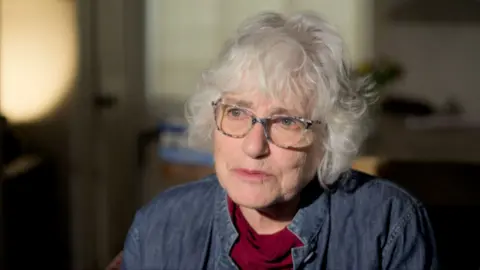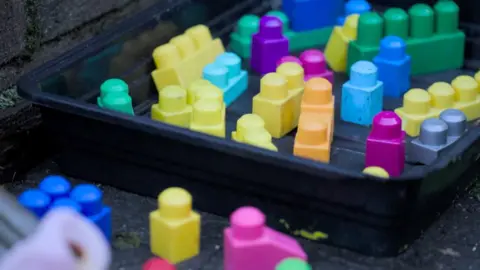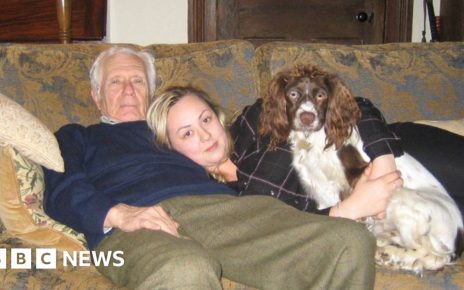BBC England Investigations
There have been almost 20,000 reports of serious childcare incidents in nurseries in England in the past five years, the BBC has found.
That is an average of about 75 “significant events” reported to Ofsted each week – including incidents of serious injury or significant harm. There have even been rare cases involving deaths.
The latest figures for serious incidents in the year 2023-24 are 40% higher than five years previously.
Ofsted – which inspects England’s education providers – says the rise may, in part, be due to its increased efforts to ensure nurseries report such events.
Industry body, the Early Years Alliance, says most providers prioritise safety and that safeguarding breaches are extremely rare.
But the parents of a baby killed by a nursery worker in 2022 describe the figures as “horrifying” and are calling for stronger safeguarding measures.
Nurseries made more than 4,200 reports of serious childcare incidents in 2023-24, compared with 3,021 in 2019-20 – according to Ofsted figures, obtained by the BBC through a Freedom of Information request.
Ofsted – which regulates more than 27,000 non-domestic childcare settings in England – says these were reports it assessed as urgent.
Incidents could range from injuries or illnesses, to serious accidents and deaths. They also include events affecting nursery premises, such as fires or floods.
Ofsted’s broad criteria for reporting can mean nursery workers “err on the side of caution”, the Early Years Alliance says. This means investigations often find no safeguarding breach has, in fact, occurred – it adds.
But a childcare expert says the rise in the number of reports highlights a “dire situation”.
“Standards [of care] are so low that the government surely has an obligation to improve them,” says Helen Penn, professor of early childhood from the University of East London.

Parents often rely on Ofsted’s inspections and subsequent ratings to help them choose the best childcare setting.
Full inspections usually happen every six years, but the regulator can inspect more often if a nursery is graded as inadequate or requiring improvement – or if concerns are raised.
Schools rated good or outstanding are usually inspected every four years – and more frequently if graded lower.
More than 1,500 nursery inspections had been brought forward after receiving reports of serious childcare incidents – Ofsted told us.
But a former Ofsted inspector told us the regulator is not conducting enough inspections to identify poor practice and protect children.
The ex-inspector, who did not want to be named, says inspections are a “tick box exercise” which are “very easy to manipulate”.
“As long as they can say: ‘We’ve asked all these questions, what more can we do?’ But you do that once every so many years – how is that safeguarding the children?” she says.
The BBC has spoken to more than 20 former and current nursery workers, all from different premises across England, who said they had witnessed poor care.
Many said frequent short-staffing was a factor in children being put at risk – and that Ofsted inspectors were not always able to spot this.
Until 2015, inspectors would arrive at nurseries unannounced – but only a third of inspections are now carried out this way. Most nurseries are informed the day before.
The notice period is used by some nurseries to deliberately mislead inspectors, some nursery workers told us. Managers ask friends or family to attend, they say, to make a nursery appear fully staffed.
One former worker said 15 babies had been left sleeping in a room with only a baby monitor and no staff members to look after them. But when Ofsted announced an inspection, managers called in staff from other locations.
The ex-Ofsted inspector says she witnessed workers man-handling children during inspections. “If you can do that in front of someone, what are you planning on doing if nobody is watching?” she adds.
Misleading inspections is an “appalling practice”, says Yvette Stanley, Ofsted’s Head of Early Years and Social Care – adding that inspectors have to rely on the “integrity of providers”.

The parents of a baby who was killed at a now-closed nursery in Greater Manchester have told the BBC they want more frequent Ofsted inspections in nurseries – and for inspectors to check CCTV, which is not current practice.
In an exclusive interview, Katie Wheeler and John Meehan say life without their daughter Genevieve is “unbearable”.
The nine-month-old died from asphyxiation at Tiny Toes nursery in Stockport, when she was tightly swaddled, strapped to a beanbag, and left unattended by nursery worker Kate Roughley for 90 minutes.
The child was seen struggling and coughing on CCTV footage, but Roughley did not check on her properly until she was “unresponsive and blue”, the worker’s trial heard. Roughley received a 14-year prison sentence for manslaughter in May last year.
“When I sent her to nursery, I never in a million years thought that anything like this would happen,” says Genevieve’s mother Katie.
“I couldn’t understand how a baby of this age could go to sleep for a nap in the afternoon and then not wake up.
“I completely lost who I was, that night in hospital, holding her.”
 Tiny Toes Stockport
Tiny Toes StockportAs police reviewed nursery CCTV as part of their investigation, it revealed a second staff member had also been causing harm to children.
Rebecca Gregory was jailed for three years last September after being convicted of the wilful neglect and ill-treatment of children, including threatening and pushing babies younger than one.
Ofsted says it cannot mandate CCTV use in nurseries. There is no government guidance on checking footage during inspections and it does not have the resources to do this, it adds.
The former owners of Tiny Toes in Stockport say they cannot comment because of an ongoing investigation by Stockport Council.

Local authorities are responsible for investigating any safeguarding concerns at nurseries.
In light of our findings from Ofsted about a broad range of incidents, we asked councils across England about the specific number of times harm had been caused to children by nursery workers.
Seventy-two out of more than 150 councils responded to Freedom of Information requests with figures indicating there had been 5,795 reports or allegations of children being harmed by nursery workers, over a five-year period between 2019 and 2024.
There were like-for-like figures from 36 councils for both that period and the five years up to 2015, when Ofsted stopped routine no-notice inspections.
Reports of harm to young children almost tripled over that time – from 1,303 between 2010-15, to 3,342 between 2019-24. These figures may include cases where the incident was either accidental or unproven.
Standards of care are low and if something does not change there will be “more accidents, more harm to babies, more unhappy parents and children,” says early childhood professor Helen Penn.

Ofsted says it is giving “conspicuous care and monitoring” to reports of harm to children.
More frequent inspections may be a solution, says Ofsted’s Yvette Stanley, but she says the regulator does not currently have the resources available to do this.
“We think we do enough no-notice inspections to reassure ourselves in the cases where the data is worrying,” she adds.
The Department for Education (DfE) has said it will introduce stronger safeguarding measures in early years settings in September, including “enhanced recruitment practices” intended to prevent unsuitable people from working with children.
A spokesperson said the department will “continue to closely monitor whether any further changes to safeguarding requirements are needed in early years to keep children as safe as possible”.





